Two years ago, Blerina Lila was expecting to give birth to her first child, with a bunch of mixed and powerful emotions, as what usually happens in such situations. She felt excited and happy, but also scared.
When the pregnancy and birth of her daughter went smoothly, relief and ease overcame her anxiety and concern. But that did not last long.
A few days after she became a mother, she began to feel weak and hopeless. Her mood constantly changed. She felt distant from everyone and everything she had enjoyed until then — including the newborn baby. It did not get better during the night when insomnia and anxiety took the place of sleep.
“I cried every day. It seemed as if no one understood me,” says Blerina.
Mothers’ mental health — a taboo
Blerina, a 30-year-old from Prishtina, works as a teacher at the SOS Children’s Village Kosovo and manages a private nursery in Prishtina. The work with children and parents has exposed her to different experiences and sentiments. During her pregnancy, she had read in order to learn more about different dynamics that would become a part of her life from the moment of childbirth. However, the new situation was still totally unexpected for her.
“Fortunately, I work in this field, and I had read about it, but I did not think I would be affected so much, to the point of thinking that it would be better not to have given birth to the baby,” says Blerina.
Today, Blerina talks about how she overcame the struggle with what is known as postpartum depression. The serious condition that affects women a few days or weeks after giving birth — with symptoms like those that Blerina experienced — is very similar to common and chronic depression, but some factors differentiate them.
Chemical changes include a rapid hormone drop after giving birth. The link between this drop and depression is still not clear. However, what is known is that the levels of estrogen and progesterone — the female reproductive hormones — increase tenfold during pregnancy. Then they fall sharply and suddenly after childbirth, and in combination with the usual social and psychological changes after childbirth, create all the conditions for depression.
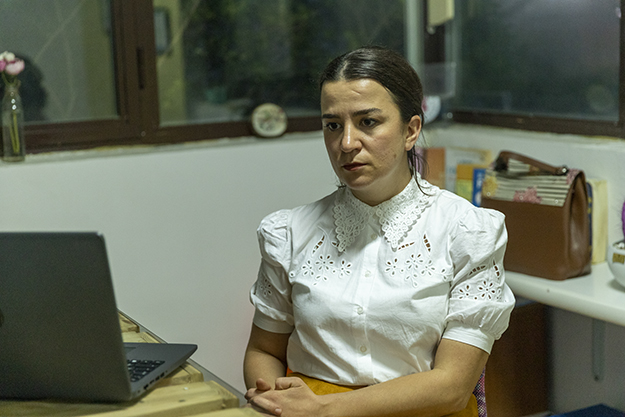
Blerina Lila did not think that postpartum depression would impact her so much, with all the information she had about it. Photo: Uran Krasniqi.
Although research suggests that one in seven women suffers from some form of postpartum depression — as it happens with mental health in general — talking about it remains largely taboo, at least in Kosovo.
While conducting this research, K2.0 met 10 women who have been or are affected by postpartum depression, but only half of them agreed to be interviewed while requesting to remain anonymous. When struggling with depression, they often did not find understanding and support from their spouses and family, which besides causing fear or prejudice also influenced their decision not to reveal their names.
Often, healthcare professionals are the only ones who understand the symptoms manifested within complex physical and behavioral changes.
Shukrie Statovci, a psychiatrist at the University Clinical Center of Kosovo (UCCK) Psychiatry Clinic, says that postpartum depression usually occurs in the first four weeks of pregnancy, with signs similar to those that Blerina had: Insomnia, isolation, distraction, the need to cry and lack of appetite.
Research shows that postpartum depression occurs in three forms, sometimes with distinctive symptoms and sometimes with identical ones, varying in intensity and duration.
Most new mothers experience the “Baby Blues,” which usually begins two to three days after giving birth and can last up to two weeks. The “Baby Blues” is characterized as mild depression and shows up in the form of sadness, melancholy, anxiety and sleep problems.
However, some mothers experience more prolonged and more intense forms of depression. This is defined as “postpartum depression,” which occurs within a few weeks of giving birth but can start earlier during pregnancy and last up to a year, and sometimes for years.
“I cried all the time, asking ‘Am I okay? I have mental problems.'”
In rare cases, after giving birth, women may struggle with psychosis — a condition that occurs within the first week after childbirth, with symptoms that require emergency treatment: Confusion and disorientation, obsessive thoughts and paranoia, hallucinations and agitation, and attempts to hurt oneself and the baby.
Mirjeta, *34 years old, from Kamenica, falls into the second category, that of general postpartum depression, but sometimes her symptoms were intense like those of psychosis.
“I cried all the time, asking ‘Am I okay? I have mental problems,’” she says.
She tells of how a few weeks after giving birth in 2016, she constantly had the feeling that she could not love her newborn daughter and would hurt her. This caused her anxiety whenever she was alone with her baby at home.
“Those days were terrible. There were moments when I wanted to commit suicide, only to stop thinking that I could hurt my daughter,” she says. “I said ‘How is it even possible for a mother to think like that?’”
Without delay, she visited the psychiatrist. Depending on the symptoms’ intensity, psychologists and psychiatrists are the ones who treat postpartum depression with psychotherapy, medication, or both, as in Mirjeta’s case.
“The gynecologist has never mentioned or discussed this topic with me,”
Mirjeta says
In the beginning, she went to psychology sessions since antidepressant therapy would be harmful to the baby due to breastfeeding. She noticed the first signs of improvement only a year later when she stopped breastfeeding and began to use antidepressant therapy.
She says that although four years have passed since she was diagnosed, she still faces the lasting effects of postpartum depression. Anytime she hears any bad news, like a murder in the city, her symptoms return, and she resumes the therapy until she recovers.
Mirjeta, who became a mother after seven years of trying to get pregnant, says that she didn’t know anything about postpartum depression. A friend who works with her in a state institution in Gjilan had mentioned it to her only once.
“The gynecologist has never mentioned or discussed this topic with me,” she says.
Beginning with poor healthcare
Gynecologists can play a tremendous role in diagnosing postpartum depression and offering the first helping hand to women. However, within Kosovo’s confounded and neglected health system, it is difficult to pinpoint the main culprit.
Magbule Elezi, the president of the Association of Midwives and a midwife herself at the UCCK’s Obstetrics and Gynecology Clinic, says that midwives should play a more important role in preventing depression.
“To manage postpartum depression, there must be a collaboration between the family, midwife and psychologist,” she says. “Apart from being a professional, the midwife becomes a woman’s friend by listening to her concerns, and her commitment has a great impact on alleviating the situation.”
Currently, I also cover neonatology patients; there is a need for more psychologists.”
Brikena Krasniqi -Hoti, a psychologist at the UCCK's Obstetrics and Gynecology Clinic
The absence of psychologists in the seven regional hospitals’ gynecology wards in Kosovo shows that the public health institutions do not pay attention to women’s mental health during pregnancy or after childbirth. On the other hand, in 2019 alone, there were 11,730 childbirths in these hospitals.
In October 2019, Brikena Krasniqi-Hoti became the first psychologist in UCCK’s Obstetrics and Gynecology department, hired to provide psychological services. However, given that she is the only psychologist there, the number of women who can get assistance from her is low. In 2019, there were 9,461 childbirths in this clinic.
“The clinic is massive, with 12 wards. Currently, I also cover neonatology patients; there is a need for more psychologists,” says Krasniqi-Hoti.
She says she mainly treats women who had complications during childbirth, and have babies with difficulties, and thereby are worried. But this service ends when women complete their gynecological treatment at the clinic. Even if a patient shows symptoms of depression, no one contacts them or monitors their condition after being released from the hospital.
Krasniqi-Hoti says that mental health care for women before and after childbirth can be provided by opening a special medical center. Currently, when gynecologists assess that a woman is experiencing mental health problems, she goes for treatment at the Psychiatric Clinic.
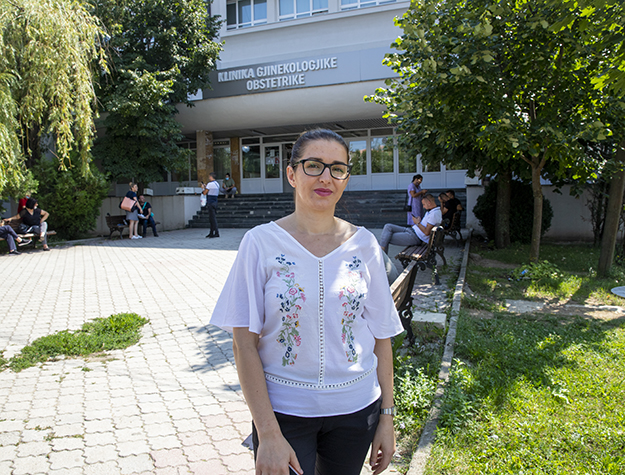
Brikena Krasniqi-Hoti is the first and only psychologist so far in the UCCK’s Obstetrics and Gynecology Clinic. Photo: Uran Krasniqi.
“The aim is to open an ambulance for psychological counseling not just for women who are hospitalized but also for those who after leaving the hospital notice that they have problems,” she says. “They would not need to go to the Psychiatric Clinic, when they could come here.”
She says that the transitions that women experience, from the first menstruation, to childbirth and then menopause, as well as the frequent gynecological health problems that are linked to hormonal changes make psychological counseling necessary.
“Therefore, in a large clinic such as the Gynecology Clinic, where hundreds of patients get treated daily, the presence of a clinical psychologist is extremely necessary; in addition to caring for their physical health, the clinic should provide services that identify and treat various emotional problems or psychological disorders,” she says.
The Gynecology Clinic does not possess data regarding the number of women referred to psychiatry, nor do they know how many women have been admitted. None of the clinics have such records because they do not cooperate with each other in order to identify and treat women admitted to the Gynecology Clinic and who need psychiatric treatment.
“Of the 10 mothers who attended one of the classes, three probably had information about postpartum depression,”
Laberie Çarreti, Action for Mothers and Children.
Although the director of this clinic, Jakup Ismajli, sees it as necessary to provide counseling to every pregnant woman about the changes that await her during and after pregnancy, he admits that the clinic he manages does not provide any such information, not even in the form of any pamphlets or booklets.
Action for Mothers and Children – AMC Health has begun to provide the services that the public health institutions do not provide. Since 2015 this organization holds educational classes for women about the pregnancy process, while since 2017 they have included the topic of postpartum depression.
Laberie Çarreti, a project coordinator in the organization, says that the centers are open in 12 cities throughout the country. Before the pandemic, they organized lectures for pregnant women twice a week. The classes are held within the Family Medicine Centers and UCCK’s Gynecology Clinic, and women’s partners can participate too.
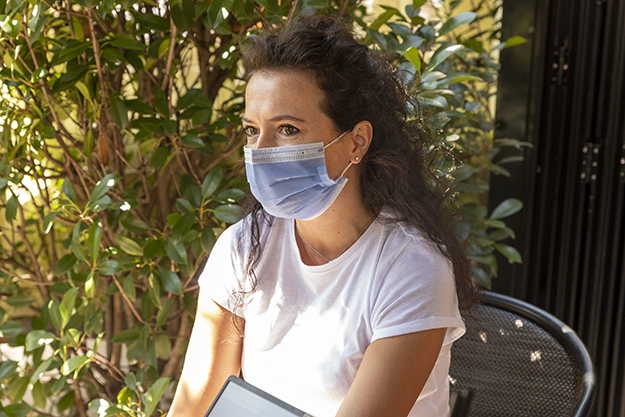
Laberie Çarreti says that the organization she works for, “Action for Mothers and Children – AMC Health,” is striving to provide access to information on postpartum depression. Photo: Uran Krasniqi
Çarreti says that during the lectures, besides receiving information on postpartum depression, women learn about the normal changes that occur during pregnancy, breastfeeding, newborn baby care, diet and physical activity.
“Of the 10 mothers who attended one of the classes, three probably had information about postpartum depression,” she says.
She emphasizes that learning more about postpartum depression enables women to seek help more easily when they do not feel well; in such cases, the organization she works for provides support through phone calls.
Exorbitant services
Meanwhile, when women try to find solutions themselves by knocking on the doors of private psychologists and psychiatrists, the prices turn out to be unaffordable not only for those who are unemployed, but also for women with average salaries in Kosovo. In one case, a woman told K2.0 that she had to pay 40 euros for one therapy session.
To verify the persession prices of therapy clinics, K2.0 has phoned some of them, claiming that they need this service due to postpartum depression.
“It is not ethical at all to charge up to 50 euros for a therapy session [which includes psychological counseling]."
Ilir Havolli, Head of the Kosovo Association of Psychologists.
The Kosovar Center for Positive Psychotherapy charges between 15 and 30 euros for a 40-minute session depending on which psychologist is chosen for consultation. At the “Empatia” clinic, a 45-minute session costs 30 euros. The “Agani” clinic charges 20 euros for a one-hour session, except if psychiatrist Ferid Agani is chosen, with whom it costs 30 euros and the duration of the visit is not defined. Lastly, a 45-minute session with psychologist Mimoza Shahini costs 30 euros.
Based on her experience so far, Brikena Krasniqi-Hoti says that a woman suffering from postpartum depression needs 10 to12 sessions beginning soon after childbirth. But in cases when depression is severe, up to six months or more of therapy are necessary.
Regarding the prices set by psychotherapeutic clinics, the head of the Kosovo Association of Psychologists, Ilir Havolli, says that there needs to be a standardization of prices for therapy sessions. He says that the varying prices are also a result of a lack of a Chamber of Psychologists.
“It is not ethical at all to charge up to 50 euros for a therapy session [which includes psychological counseling]. This exceeds every norm. A therapy session should cost 20 euros,” Havolli says.
Grim first contact
Edita* had not heard about postpartum depression before she purposefully looked it up one day.
One month after she gave birth to her second child she began feeling unwell, and seven months later her condition got even worse. Trying to find an explanation for the symptoms she experienced led her to learn about postpartum depression. She says that she did not deal with this situation the first time she gave birth.
"I waited for nine months to experience that moment, but I was humiliated."
Edita says
Ten months after giving birth, she continues to face many difficulties: She has lost breast milk prematurely, her relationship with her first, now three-year-old child has weakened, and she feels powerless to take care of both children.
“It feels like life is over for me. Everything I do feels wrong. It feels like my son will turn one and I’m still not going to get over this,” Edita says. “Sometimes I am not able to answer my daughter. Often I have to end the conversation right then and there. It is more often that I tell her ‘don’t talk this much’ instead of sitting down and talking with her.”
Psychologist Brikena Krasniqi-Hoti says that mothers with postpartum depression feel guilty that they may not be good enough.
“This affects their sleep, regular nutrition and tires them out incredibly, which also affects the amount of breast milk and its quality,” says Krasniqi-Hoti.
Edita herself is convinced that her mental health has deteriorated since her stay at the UCCK Gynecology Clinic.
“I waited for nine months to experience that moment, but I was humiliated. “They told me: ‘You liked doing it with a man, now you have to take care of the kid yourself, we can’t do anything about it,'” she says.
Edita says that her experience at UCCK was full of contempt and carelessness, which has left consequences on her mental health.
“The doctor saw that I started screaming a little and my water broke, but she had gone out for a coffee. I paid her for nine months, and one day before I gave birth, my husband gave her an additional 50 euros to take care of me. After her coffee, she came back after I had given birth and she said to me: ‘Edita, you already gave birth?'” she says.
K2.0 has requested data from the Kosovo Police to see if they have identified cases of bribery in the UCCK respectively in the Gynecology Clinic, but the police have said that they do not make such categorizations regarding institutions.
The director of the clinic, Jakup Ismajli, who has been running it for the last two years, says that such behavior does not happen,, and that he has not received any complaints from patients about poor treatment.
.
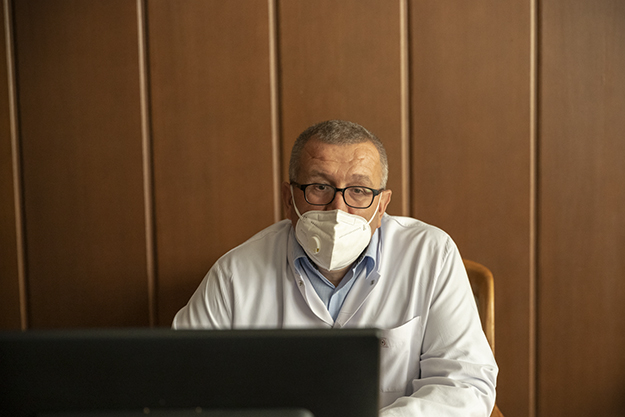
Jakup Ismajli, director of the Gynecology Clinic at the UCCK, says that women need to be offered counseling for the possible changes after pregnancy, although the clinic he directs does not offer any. Foto: Uran Krasniqi.
But over the years there have been reports of poor treatment of patients in this clinic. A well-known case of negligence happened in 2017 when a woman had given birth in the hallway of the clinic. She said that this happened after she was neglected by the medical staff. During its birth, the baby suffered a head injury which caused a brain bleed.
Regarding patient complaints about the UCCK, K2.0 has also contacted the Patients’ Rights Association in Kosovo. They said that during the period between 2015-2017 while they had an office at UCCK, they received several complaints regarding the improper treatment in the Gynecological Clinic, but from 2017 until now they have not had any.
But the Association did not provide details on the number of complaints received and how they dealt with them, arguing that the complaints were archived and and there was no staff to process them.
Brikena Kransiqi-Hoti says that the behavior of people who have contact with pregnant women has a great impact on their emotional state, especially with those who are more sensitive.
“It is important that there is warm, friendly behavior, be it from the medical staff or from the partner and the family because it has an extraordinary impact,” she says.
Between stigma and impacted mental health
In spite of the importance of health workers, it is the relatives — and in particular the husband — whose support can play a crucial role in helping women overcome postpartum depression more quickly, according to mental health experts.
But most of the women interviewed by K2.0 confess that instead of support they have encountered stigma and disregard.
"I have to be careful of others so that they don’t know I’m depressed because it’s shameful."
Edita says she was left alone while coping with postpartum depression even though she lives in a large family. She lives with her husband, two children, her husband’s parents and sister-in-law.
Despite her obviously severe mental state, she is yet again required to perform the expected duties as part of the traditionally defined roles within the home: To take care of household chores and guests.
“I have to be careful of the others so that they don’t know I’m depressed because it’s shameful. Even if you feel bad, you have to laugh in front of others. “It makes me feel even worse,” she says.
She says her husband and family have constantly judged her as weak, causing her to lose even more of her self-confidence and making it impossible to cope with depression.
“Ever since I gave birth to my son, every person has tried to prove to me that I am stupid, or that I should not talk about my condition,” Edita says. “The only right I have is to laugh, look after the children and move on with my life.”
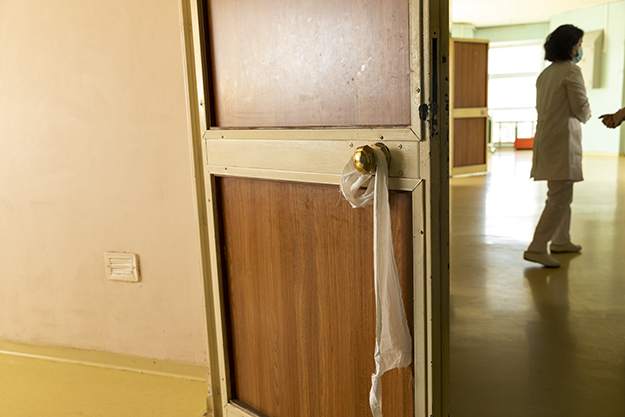
Women with postpartum depression deal with stigmatization from their own families. Foto: Uran Krasniqi.
Sociology professor Linda Gusia says that the expectations of Kosovar society toward women who have given birth causes pressure, as they are expected to be ideal: To take good care of children, the home, their husband, to get their pre-baby body back and to be successful at work.
“When someone has some other illness, society mobilizes to help, but when it comes to mental health, especially postpartum depression, there is a tendency to stigmatize, which does not help at all with the recovery of that person,” she adds.
Meanwhile, Mirjeta lost the progress she made through the psychological sessions, due to an unsuitable family environment.
“What’s worse, not even my husband understood me. He knew that I was seeing the psychologist, but he never sat down to talk with me about my condition,” she says. “Even my own mother would always tell me: ‘You have it so good that you’re acting spoiled, God gave you a daughter, you have a job.’”
"One of the patients told me that the 'sessions' with the imam were abusive, because she was in a bad mood, she cried and he told her that she had become a mother and that she should take care of the baby."
Shukrie Statovci, psychiatrist
Laberie Çarreti from the “AMC Health” organization says that based on the experience of their activities so far, there is a great necessity to spread more knowledge about postpartum depression in order to understand that this type of depression is not the choice of the mother, but rather “a feeling that comes naturally due to many factors.”
“There have been cases in villages where we have been told that this depression is due to ‘acting spoiled’ as our grandmothers gave birth to 6 or 7 children and did not have such problems, nor did they know what depression is,” Çarreti says.
Health professionals point out that there have been cases where treatment has been delayed due to superstition, despite the willingness of family members to help. For example, sometimes the condition of women would worsen because they were initially sent to people who do not have health expertise and use non-scientific methods such as writing charms.
“One of the patients told me that the “sessions” with the imam were abusive, because she was in a bad mood, she cried and he told her that she had become a mother and that she should take care of the baby,” says psychiatrist Shukrie Statovci. “Thus, he only made her feel guilty about her condition.”
She explains that another challenge in treating women with severe postpartum depression, especially in cases where their condition causes psychosis, is the stigma that surrounds the Psychiatric Clinic itself and the judgmental public perceptions about mental health.
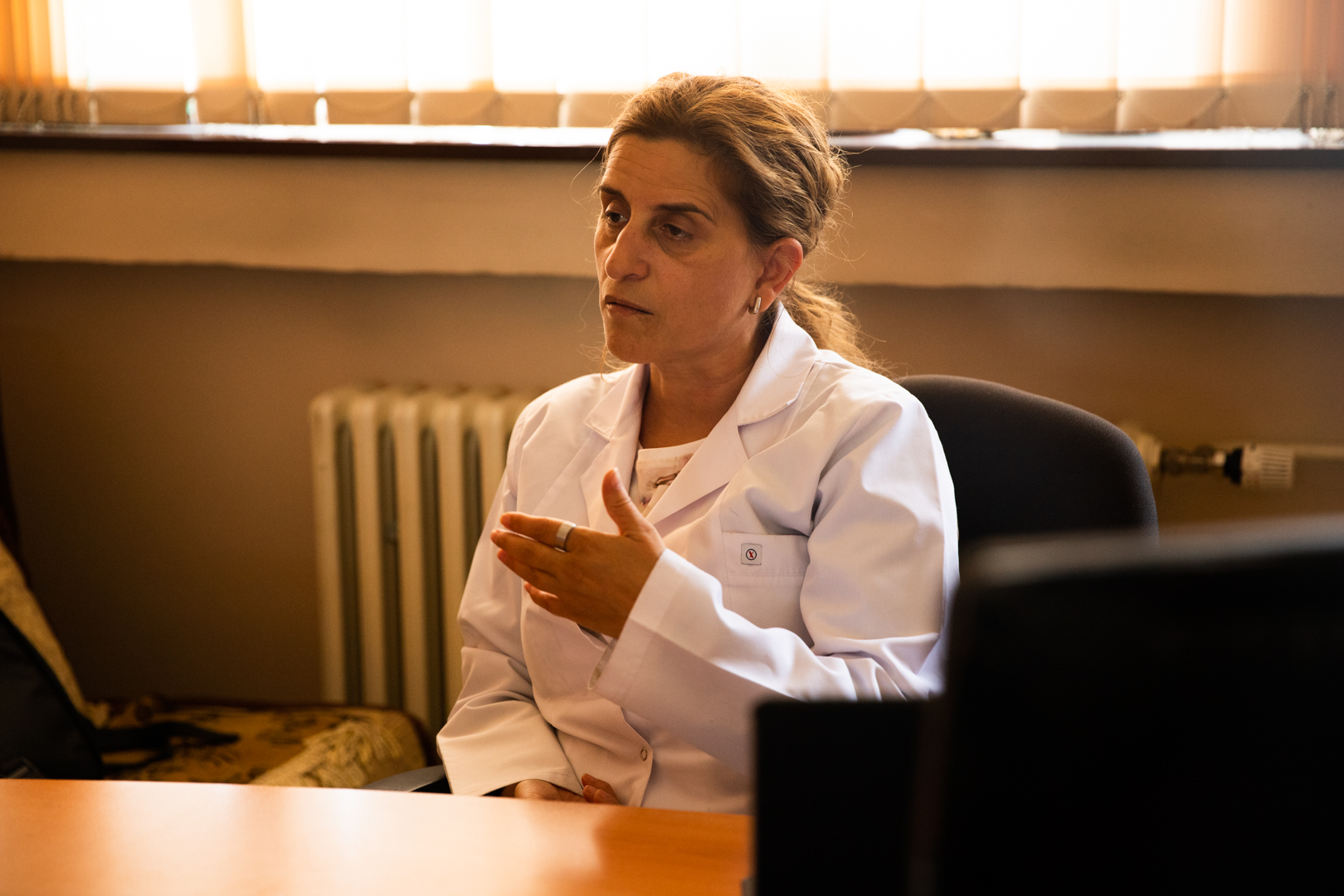
Shukrie Statovci, psychiatrist at the Psychiatric Clinic, says that family members are continuously failing to help women who suffer from postpartum depression. Photo: Uran Krasniqi.
Gusia adds that postpartum depression should be talked about more in society, especially in the media, so that citizens are more informed about this issue and it becomes possible for depression to be understood as a problem that needs help from health professionals and not to remain a taboo topic.
The case of Blerina Lila shows that the support and understanding of the family and close friends is very important. She says her husband and family helped her with household chores and taking care of her daughter.
“There were moments when my child cried a lot, it was not comfortable and it made me very nervous. I asked for help from my husband or parents, and my mother or sister-in-law dealt with her, and I moved aside because I had to calm down,” she says. “And this breather has helped me a lot.”K
Feature image: Uran Krasniqi.
*Editor’s note: Mirjeta and Edita are pseudonyms in order to protect the privacy of the sources at their request.
This publication is part of the third cycle of the Human Rights Journalism Fellowship Program, supported by the European Union Office in Kosovo. The program is co-supported by the National Endowment for Democracy. This program is being implemented by Kosovo 2.0, in partnership with Kosovar Center for Gender Studies (KCGS), and Center for Equality and Liberty (CEL). Its contents are the sole responsibility of Kosovo 2.0 and do not necessarily reflect the views of the donors.












